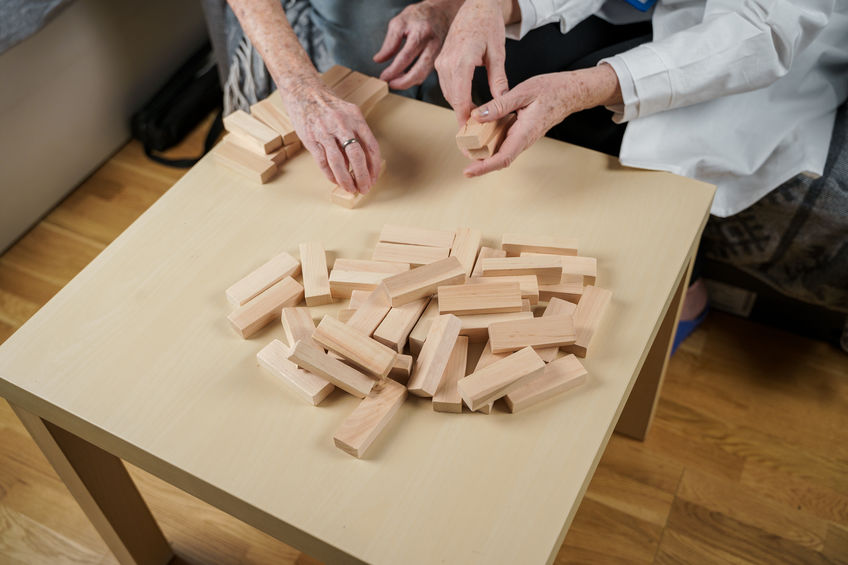 Our brains are quite powerful, and we often take for granted the amazing things they do for us each day. Remembering how to get to your friend’s house, make your favorite recipe, or other seemingly small tasks are just a few of the things our amazing brains can help us do; however, when tasks like these begin to take on a new difficulty due to memory loss, feelings of frustration, sadness, and anxiety can begin to take over. When someone you love begins to struggle with these things, it can be very difficult to stand by and watch. So here are six ways to help reduce anxiety in dementia patients Tuscaloosa that may be helpful for your loved one.
Our brains are quite powerful, and we often take for granted the amazing things they do for us each day. Remembering how to get to your friend’s house, make your favorite recipe, or other seemingly small tasks are just a few of the things our amazing brains can help us do; however, when tasks like these begin to take on a new difficulty due to memory loss, feelings of frustration, sadness, and anxiety can begin to take over. When someone you love begins to struggle with these things, it can be very difficult to stand by and watch. So here are six ways to help reduce anxiety in dementia patients Tuscaloosa that may be helpful for your loved one.
1– Help them find their bearings.
If your loved one is struggling with the effects of memory loss and has not had an evaluation with their medical provider, this is a great first step toward a potential diagnosis. Finding out what’s going on and crafting a game plan for how to address issues is a good way to squash feelings of anxiety in dementia patients and others struggling with memory related issues. Calming stresses helps free up more brain power for other things, and having someone by your side when you deal with difficult issues can make a world of difference.
2– Allow time to process.
Getting a dementia or Alzheimer’s diagnosis can feel like a very heavy thing. Give your loved one time to process the news and work through their feelings about it. Everyone is different too. Some people feel relieved when they receive a diagnosis because it’s helpful to know what’s going on. For others, the diagnosis feels devastating. It’s important to just be there for your loved one during this time, and offer them whatever type of support they need most. No matter what, patience is key and can help curb the feelings of anxiety.
3– Show them that memory loss isn’t who they are.
Though the conditions we deal with are a part of us, they don’t define who we are as people. We are more than our struggles. Help your loved one continue to live a life full of purpose and meaning. This will help ease anxiety and ward off sadness. Work to help keep them engaged in enjoyable activities. Find activities you can do together. Have conversations that are meaningful.
4– Create a network of supporters.
Being open about a diagnosis with friends and family can also help reduce anxiety for dementia patients. If people know what’s going on, they may be willing to help out when needed, but they can’t help if they don’t know the situation. The more people you have to help out and offer their support, the less the stress and anxiety the person with dementia has to bear alone.
5– Help them feel important and needed.
It’s nice to be needed. Sometimes when we begin to age, loved ones want to do everything for us, but this can potentially have adverse effects. Though well-intentioned, going overboard with helping or caring for an individual can make them feel unnecessary. People have an innate need to feel valued, and allowing others to contribute– even with menial, everyday things, helps to nurture that need. Maybe ask your parent to help prepare dinner, or set the table. Making a contribution keeps them engaged, active, and feeling needed.
6– Help them face symptoms head on.
Dealing with dementia and memory loss can come with feelings of helplessness. Dementia and Alzheimer’s patients may feel like they need to rely on family members much more than they’re used to, making them feel like they can’t manage on their own. No adult person wants to feel that way. You can help your loved one deal with the anxiety that comes from this by ensuring they are well informed about their condition. Help them get the information they need from various sources, and work with their medical providers to craft a plan for how to manage symptoms. Being intentional about your approach to this diagnosis can have a profoundly positive impact for your loved one.
No matter what, we hope you know that at Regency, we always work toward an even greater understanding of these memory-related conditions and their symptoms so we can provide the best care and support possible for our memory care residents. We’re here to help you and your loved one however we can.

